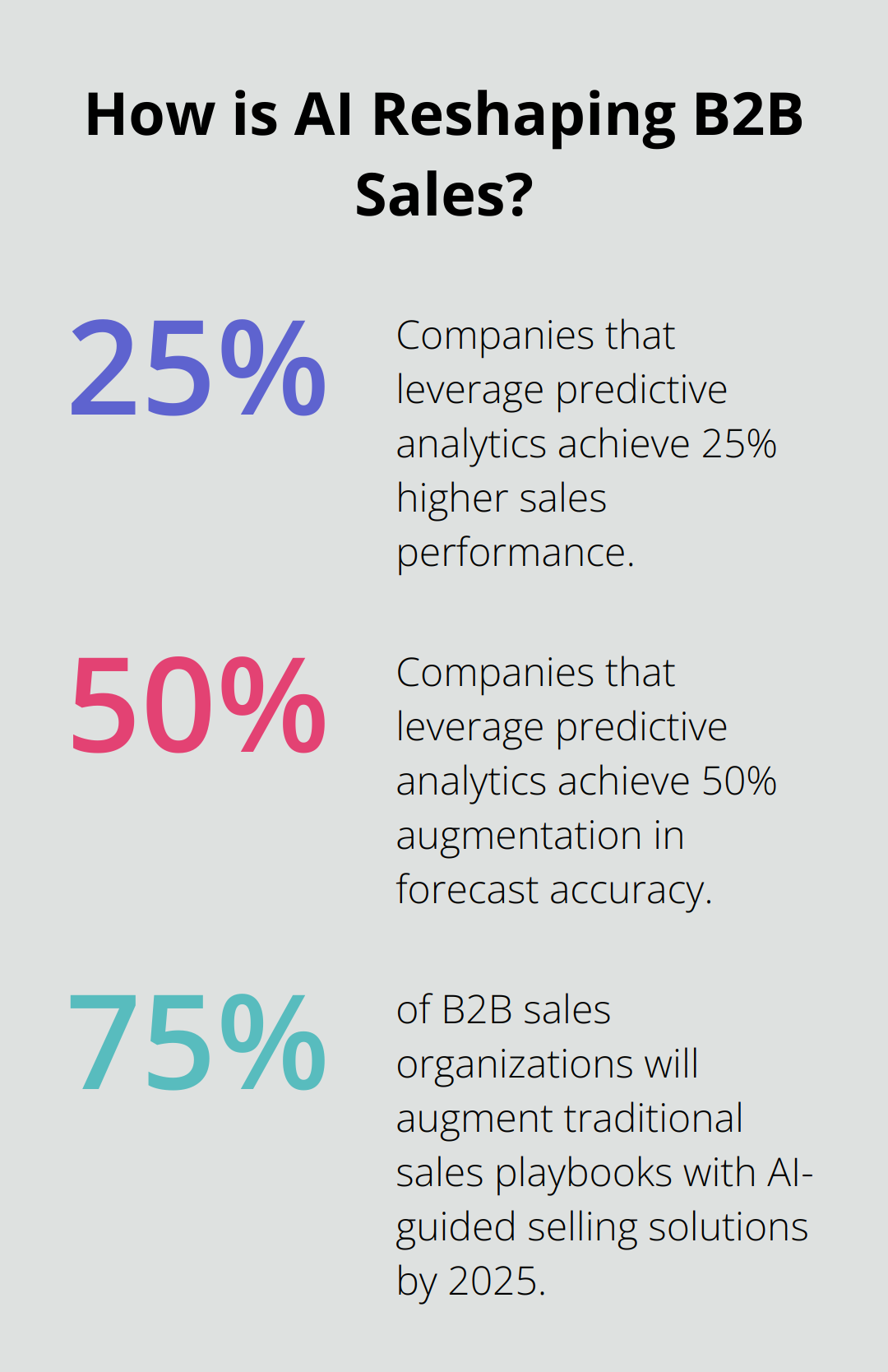At Help Reply, we’re constantly exploring the intersection of technology and customer service. The question “Can AI replace sales teams?” has become a hot topic in the business world.
As AI continues to advance, it’s reshaping the landscape of sales and customer interactions. In this post, we’ll examine the current state of AI in sales, its strengths and limitations, and what the future might hold for human sales professionals.
AI in Sales Today
The Evolving Landscape
The sales industry has undergone a significant transformation with the integration of artificial intelligence (AI). This technology now shapes how sales teams operate, providing powerful tools that boost efficiency and effectiveness.
AI-Powered Sales Tools
Sales professionals now have access to a wide range of AI-powered tools. Customer Relationship Management (CRM) systems (like Salesforce Einstein) use AI to predict sales outcomes and prioritize leads. Conversational AI platforms handle initial customer interactions, qualifying leads before human intervention. Help Reply offers an AI solution that responds to customer inquiries within one minute, 24/7, and integrates with popular platforms like Gmail and Shopify.
Data-Driven Decision Making
AI’s capacity to analyze vast amounts of data has revolutionized sales strategies. Predictive analytics tools forecast customer behavior and identify potential churn risks. Companies that leverage predictive analytics achieve 25% higher sales performance and 50% augmentation in forecast accuracy.
Adoption Rates and Impact
The adoption of AI in sales departments continues to accelerate. This trend shows no signs of slowing down, with predictions that 75% of B2B sales organizations will augment traditional sales playbooks with AI-guided selling solutions by 2025.

The impact of AI on sales performance is substantial. High-performing sales teams are more likely to use AI compared to underperforming teams. Companies that use AI for sales forecasting have improved their forecast accuracy significantly.
As AI technology advances, its role in sales will likely expand. However, the human element remains essential in building relationships and closing complex deals. The next section will explore the strengths that AI brings to the sales process, highlighting how this technology amplifies their abilities. When used effectively, these AI-powered tools dramatically increase sales efficiency.
How AI Supercharges Sales Teams
Unmatched Data Analysis
AI revolutionizes the sales industry with its ability to process massive amounts of data. Sales teams now access actionable insights that were previously unattainable. AI algorithms analyze customer behavior patterns, purchase history, and market trends to identify high-potential leads. Research by McKinsey shows that AI can increase sales leads by over 50% and reduce call times by up to 60%. This level of analysis allows sales teams to prioritize the most promising opportunities, significantly improving their efficiency.
Automation of Time-Consuming Tasks
AI’s contribution to sales extends to the automation of repetitive, time-consuming tasks. AI-powered tools handle data entry, appointment scheduling, follow-up emails, and basic customer inquiries. Salesforce reports that sales reps spend only 34% of their time on actual selling, with administrative tasks consuming the rest. The automation of these processes allows sales professionals to concentrate on their core strengths: relationship building and deal closing.
Continuous Customer Engagement
The global marketplace demands instant responses at all hours. AI chatbots and virtual assistants provide round-the-clock availability, ensuring prompt attention to every inquiry. This constant availability improves customer satisfaction and captures leads that might otherwise be lost due to delayed responses. (For instance, Help Reply’s AI solution responds to customer inquiries within one minute, regardless of the time of day.)
Personalization on a Massive Scale
AI empowers sales teams to deliver tailored experiences to a vast number of customers simultaneously. Through customer data analysis, AI customizes product recommendations, email content, and even pricing strategies to individual preferences. Epsilon research indicates 80% of consumers are more likely to make a purchase when brands offer personalized experiences. AI enables sales teams to provide this level of personalization to thousands of customers at once (a feat impossible to achieve manually).
Predictive Sales Forecasting
AI transforms sales forecasting from guesswork to a data-driven science. Machine learning algorithms analyze historical sales data, market trends, and external factors to predict future sales with remarkable accuracy. This predictive power allows sales teams to allocate resources more effectively, set realistic targets, and identify potential roadblocks before they materialize.

As AI continues to evolve, its impact on sales strategies will only grow. The next section explores the limitations and challenges that AI faces in the sales environment, highlighting the areas where human expertise remains irreplaceable.
The Human Touch AI Can’t Replace
Emotional Intelligence: A Human Advantage
AI lacks the nuanced understanding of human emotions that’s often essential in sales. Studies have shown that sales professionals with high emotional intelligence outperform their peers by 50%, leading to a 32% increase in sales revenue. This emotional quotient allows human sales teams to read between the lines, pick up on subtle cues, and adapt their approach in real-time – something AI struggles to replicate.
Navigating Complexity and Creativity
When faced with unique or complex situations, AI often falters. A survey by Salesforce revealed that 79% of business buyers say it is absolutely critical or very important to interact with a salesperson who is a trusted advisor – not just a sales rep, especially for high-value, complex purchases. Human sales professionals excel at creative problem-solving, offering tailored solutions that go beyond pre-programmed responses.
The Challenge of Algorithmic Bias
AI systems are only as good as the data they’re trained on. A report by McKinsey highlighted that AI models can perpetuate and even amplify existing biases in sales data, potentially leading to discriminatory practices. This issue requires constant human oversight and intervention to ensure fair and ethical sales practices.
Implementation Hurdles
Integrating AI into existing sales processes presents challenges. A study by Gartner found that 87% of organizations struggle with low AI maturity. This includes difficulties in data quality, skills gaps, and resistance to change among sales teams. Successful AI implementation requires significant investment in training, infrastructure, and change management – factors that many organizations underestimate.
The Power of Human Connection
Despite AI’s advancements, it cannot replicate the genuine human connection that often seals deals. Sales professionals build trust, empathize with clients, and create lasting relationships (elements that AI cannot fully replicate). This human touch remains invaluable, particularly in high-stakes or emotionally charged sales situations.

Final Thoughts
AI will not replace sales teams entirely, but it will transform how they operate. The future of sales lies in the synergy between AI’s analytical power and human expertise. Sales professionals who embrace AI as a tool to enhance their skills will thrive in this new landscape.

Organizations must strike a balance between AI efficiency and human touch to succeed. AI excels at data analysis and automation, while humans provide irreplaceable emotional intelligence and relationship-building skills. This combination creates a powerful approach that meets modern market demands while maintaining personal connections.
At Help Reply, we understand the importance of this balance in sales and customer support. Our AI-powered solution enhances customer interactions, allowing human teams to focus on strategic relationship-building. The question “Can AI replace sales?” has a nuanced answer: AI will not replace sales teams, but it will revolutionize how they work.


Leave a Reply